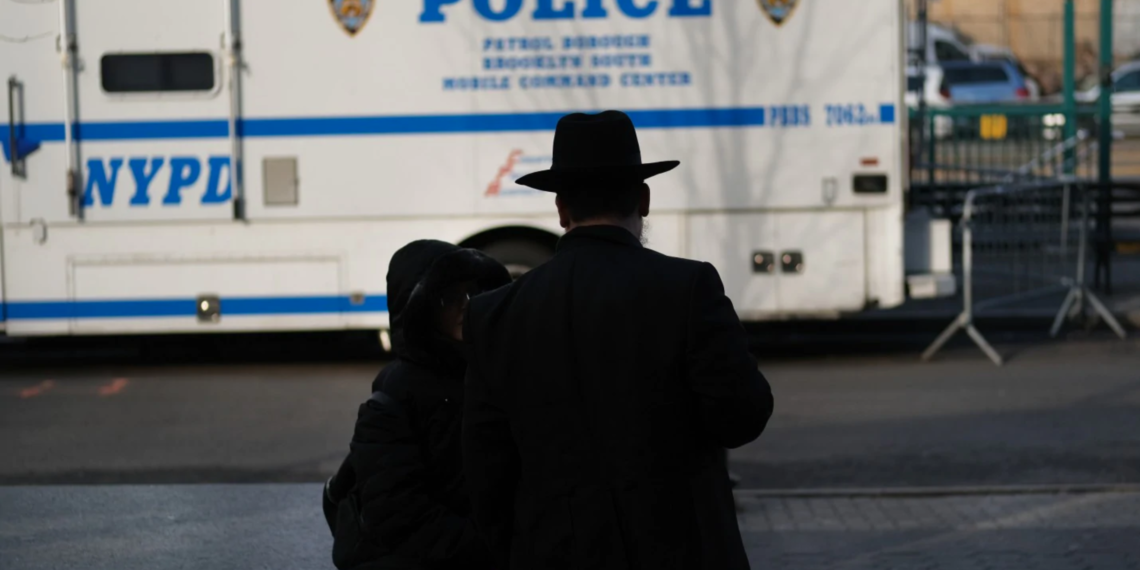Seventy-five years after the liberation of Auschwitz, violent anti-Semitic attacks have become regular occurrences. Yet those incidents do not tell the whole story. “Socially accepted” anti-Semitism – public comments and assumptions made without a cringe – is the underlying layer through which violence against Jewish communities emerges.
This socially accepted anti-Semitism is not only found among the general public but has also been internalized somewhat by parts of the American Jewish community.
Acceptance and Tolerance
As a bioethicist, I work with many different people across the country on issues relating to the ethical implications of biotechnology and health care. Sometimes when meeting new colleagues, a person will say to me, “Are you Jewish? I have a Jewish friend.” Every so often, the next line will be, “Do you know them?”
I wear the traditional Jewish accouterments, so I understand how a person will identify me as such. I also understand that the person who mentions my Jewish identity is trying to convey acceptance and tolerance as if to say, “I know about your kind, and I accept you.”
Yet, the comment itself leaves the impression that the presumption is that I would not be accepted. That is why the person must announce my acceptance explicitly.
Would the same person say, “Are you black? I have a black friend.” Or, “Are you are Muslim? I have a Muslim friend.”
Jews in America
The innocence with which these statements are made speaks to the difficulty that many Americans have with coming to terms with where Jews fit in the United States.
Given the disturbing resurgence of anti-Semitism and Holocaust denial in the United States, we must remain steadfast in our pledge to stop hatred wherever and whenever it exists. #NeverAgain
— Sen. Jeanne Shaheen (@SenatorShaheen) January 27, 2020
On the one hand, many Jews blend in and are seen as part of the American – by which I mean white – population. On the other hand, many Jews don’t, either due to the religious and cultural customs of dress and habit or even due to their skin color since Jews come from all over the world.
This discomfort over how to categorize Jews in a time of identity battles and intersectionality creates the need for people to make their acceptance explicit as it can no longer be presumed.
Identification
The question of how to relate to an explicitly Jewish presence does not only arise in inter-cultural introductions. I once participated in a Jewish medical ethics discussion group, which refers to the group consisting of medical ethicists who were predominantly Jewish, and not to the discussion revolving around the relationship between Jewish theology and medicine.
The discussed topic was whether it was appropriate to share with patients that a member of the healthcare team was Jewish. The concern was that if the patient knew, they may feel uncomfortable, either because the patient may think that the professional was imposing their values on them or because they may believe that the professional might have certain biases that would affect treatment.
No one in the group supposed that the professional would impose their values on the patient or would in any way undermine the patient’s autonomy. Instead, the concern was over the very identification of the professional.
Internalized Discomfort
During the discussion, two ideas kept coming to mind. First, I wondered how the group would consider what someone who wore a kippah should do. Would they say that I should take off my kippah when speaking to patients, for fear of coming across as biased or lacking empathy? Sure, there are times when I put on a baseball cap, but I do so out of my own insecurity or desire to feel anonymous. I don’t do it out of respect for the sensibilities of those with whom I will inevitably interact.

Second, I wondered how the conversation would be different if the healthcare professional were African or Asian. Bioethicists have condemned allowing racist patients to demand treatment solely from white doctors. Moreover, medical education across the country provides cultural competency training, which focuses on how professionals can engage in shared decision-making with patients from different cultural backgrounds.
The seriousness with which the Jewish medical ethics group engaged in the discussion betrays the same discomfort, albeit internalized, as the person who asks me if I am Jewish and then tells me that it is okay that I am. The question of how Jews fit in our multi-cultural American society is now a question that American Jews feel the need to ask themselves.
The Nod
In 2014, the sitcom Black-ish aired an episode, The Nod, in which the father tries to explain to his son that when two black people pass each other in the street, they should give each other “the nod” signifying that they acknowledge each other and therefore acknowledge their heritage. By the end of the episode, the father realizes that while his son had no idea what the nod is, he does give the nod to members of his identified community – fellow nerds.
After seeing the episode, I could not help but think about the many times I would pass other Jews on the street whom I did not know and asked myself: should I give a nod?
I would think about how my nod would be received, what would the acknowledgment of one person I didn’t know say about all the other people on the street that I didn’t know and didn’t acknowledge, and how my nod would be an act of declaring an identity and whether I wanted to do so or not.
All these questions betray the sense that the combination of Jewish solidarity and American pride does not result in the same types of hyphenated identities or recognition of multi-cultural differences that are either given or chosen in other communities.
Prejudices and Biases
These experiences have led me to realize two lessons.
First, when thinking about “the Jewish question,” ask how the connotations of the idea and its acceptability would change if the word “Jewish” is changed for another population, whether that be racial, religious, or cultural. If it sounds prejudicial, it probably is.
Second, blending in is not a good strategy, for Jews or anyone else in America. For some, it doesn’t work. For all of us, it reinforces the prejudices and biases that blending in seeks to avoid. I am not saying that all Jews should put on a kippah or wear a Jewish star, but Jews shouldn’t feel the need to hide their identity by wearing a baseball cap when there is no other need than for “disguise.”
These lessons are the flip side to philosopher Tzvetan Todorov’s statement, “Germans should talk about the singularity of the Holocaust, Jews should talk about its universality.” Todorov meant that Germans should take responsibility for their actions while Jews should emphasize that hatred can victimize anyone.
Todorov’s advice seeks to come to terms with the past so as not to repeat it. My advice is its complement: “socially accepted” prejudice is not acceptable, and the Jewish community should not fear or hide its own identity.
Disclaimer: The views and opinions expressed here are those of the author and do not necessarily reflect the editorial position of The Globe Post.





















